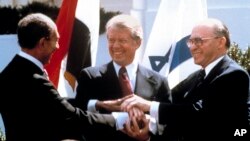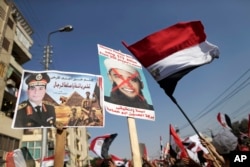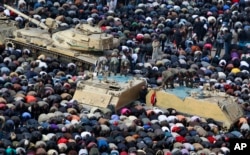Washington's surprise decision this week to cut or delay nearly $300 million in aid to Egypt is the first time the Trump administration has publicly called out Cairo on its poor human rights record.
It was also the latest twist in a decades-old relationship marked by dependence and disappointment on both sides.
Milestones in Egypt's relations with the United States:
Tensions under Nasser
The young Egyptian officers who seized power in Egypt in 1952 and later toppled the monarchy initially flirted with the United States through various channels. But vociferous, anti-Israel rhetoric by the charismatic Arab nationalist leader Gamal Abdel-Nasser, coupled with Cold War realities, doomed any hope that Washington could become Cairo's superpower patron.
A 1955 deal by Egypt to buy Soviet weapons through Czechoslovakia landed Egypt deep in the Soviet camp despite Cairo's efforts to build its credentials as a non-aligned nation. Any hope that Egypt might still end up on the side of the U.S. was shattered when Moscow agreed to build a massive hydroelectric dam on the Nile in southern Egypt after the World Bank, reportedly at Washington's behest, declined to finance the project.
Relations plunged deeper when Egypt accused the United States of colluding with Israel in the 1967 Middle East war. Ironically, however, U.S. influence in Egypt began to creep in soon after Egypt's humiliating defeat in that conflict, when Washington brokered a 1970 cease-fire that ended months of intensive fighting between Egypt and Israel.
In a surprise move, President Anwar Sadat in 1972 expelled thousands of Soviet military advisers and their families, arguing that Moscow was not doing enough to help the Egyptians match Israel's military might. A year later, Egypt and Israel fought the last of their four wars and the road was paved for Washington to replace Moscow as the most dominant foreign power in the Middle East.
Camp David and the massive aid
Washington brokered a cease-fire between Egypt and Israel that ended the 1973 war and later negotiated disengagement pacts between the two armies in Sinai and west of the Suez canal. Those deals established Washington as a key interlocutor between the two longtime enemies, but it was Sadat who significantly raised its profile as a Middle east peace broker.
A year after his historic 1977 visit to Israel, Egypt and Israel signed the Camp David peace accords, which provided the basis for a peace treaty signed the following year, the first between Israel and an Arab state. Fatigued and economically ailing due to the war, Egypt was in for some U.S. largesse as a reward for making peace with Israel.
An ambitious U.S. military and economic program kicked off — first on a modest scale — then grew steadily in size and scope. Egypt became a close U.S. ally and the two countries' annual war games, held in Egypt and code-named ``Bright Star,'' symbolized that relationship. Sadat was assassinated in 1981, but his successor, Hosni Mubarak, maintained Cairo's close ties with Washington and honored the peace treaty with Israel. His annual visits to the White House for most of his 29 years in office evidenced just how close the two nations were.
US role in toppling Murbarak and the implications
Many in Egypt and elsewhere in the Arab world fault the Obama White House for its support of the Arab Spring uprisings that began in late 2010 in Tunisia and later swept across Egypt, Libya, Yemen, Syria and Bahrain. In Egypt, withholding support for Mubarak in the face of an 18-day uprising against his rule is widely seen as a major contributor to his decision to step down.
But it does not stop there. Many commentators see his support for the uprising in Egypt as part of a U.S. conspiracy to weaken Arab states and plunge them into civil strife, thus benefiting Israel. That sentiment endures to this day, with former President Barack Obama vilified by many and Donald Trump hailed as a pragmatist who values stability over the tumult of unfettered freedoms.
Tensions under Obama over humanitarian issues
Obama made clear that he was unhappy over the Egyptian military's 2013 overthrow of the country's freely elected president, the Islamist Mohammed Morsi. While noting that Morsi's rule was not inclusive and acknowledging the mass street protests against his government, Obama said he did not approve of how things turned out in the aftermath of Morsi's ouster, namely the mass arrest of his supporters and the clampdown on civil society groups.
Abdel-Fattah el-Sissi, the general-turned-president who led Morsi's ouster, was kept at arm's length by Obama, who never extended him a White House invitation. Obama also ordered a partial suspension of military aid to Egypt in October 2013 to protest Cairo's poor human rights record and the crackdown on dissent. But with an eye on Egypt's key role in the global fight against terrorism, he restored it in 2015.
Still, that was not enough to clear the air, with pro-el-Sissi commentators demonizing Obama for denying Egypt the weapons it needed to fight Islamic militants battling its security forces in the Sinai Peninsula and claiming that his administration supported Morsi's now-banned Muslim Brotherhood and sought to destabilize Egypt.
Reboot under Trump
A new page was turned in Cairo's relations with Washington when Trump became president, a handsome payoff for el-Sissi's gamble when he appeared to favor the Republican nominee over his Democratic rival, Hillary Clinton, following meetings with both candidates in New York in September 2016.
El-Sissi finally received his White House invitation soon after Trump's inauguration and his much heralded visit took place in April. There was no mention of Egypt's human rights record in the readout issued after their Oval Office meeting, something that led many to believe that democracy and freedom would no longer figure in Cairo's relations with Trump's America.
The Egyptian media, most of which is blindly loyal to el-Sissi, celebrated the new “strong leader” in the White House and el-Sissi often spoke in glowing terms of Trump. It is against this backdrop that Washington's decision to cut or delay nearly $290.7 million in military and economic aid came as an unpleasant surprise to Cairo.
Still, it's too early to say whether the move will hurl Egypt and the United States back to the Obama days when Egypt's human rights record constantly soured relations, or whether the “Bright Star” war games will resume as scheduled later this year after an eight-year hiatus.







